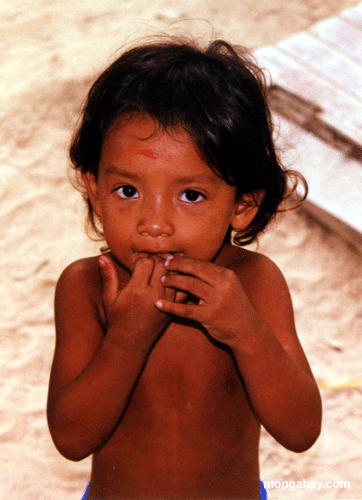Indigenous groups oppose National Geographic, IBM project
Tina Butler, mongabay.com
May 9, 2005
[continued from page 1] Despite the seemingly beneficial aspects of the project to native populations, this focus on the collection of genetic materials from indigenous peoples is where the controversy behind this project resides. The Indigenous Peoples Council on Biocolonialism (IPCB), an organization that provides educational and technical support to indigenous peoples in the protection of their biological resources, cultural integrity, knowledge and collective rights, is distressed at the news of this new endeavor. The organization formed in 1993 to oppose the Human Genome Diversity Project (HGDP). The HGDP was unable to secure federal or United Nations support or endorsement from the National Science Foundation and UNESCO because of its inability to address and meet ethical concerns and standards. Representatives for the IPCB are wary of the similarities of this new program to the HGDP, which also relies on the collection of indigenous peoples’ DNA and believe that the Genographic Project is an attempt to escape legal and public judgment because it is privately funded. For the IPCB, projects of this type echo disconcertingly of the racist and ethically-impaired Eugenics movement of the early decades of the 20th century.
Back in 1993, the HGDP faced international opposition by indigenous peoples who considered the genetic researchers behind the project to have designs on pirating their DNA for their own, unethical means. In recent years, indigenous peoples have acquired increased knowledge and awareness about biopiracy and are taking active roles to ensure that their human rights are considered and contended with in the research process. In 2004, the Havasupai tribe of Arizona filed a lawsuit against Arizona State University for “the taking and misuse of genetic samples.” The Havasupai held research scientists at the university accountable for use of their genetic material without prior informed consent. While the tribe authorized diabetes research, it was later discovered that the samples were analyzed for inbreeding and schizophrenia, among other things, but not the initially stated disease which affects members of the tribe.
 Child in community of the Amazon rain forest Photo by Rhett Butler |
Indigenous peoples have consistently voiced their opposition to this type of research because it breaches cultural values, bioethical standards and human rights law. The IPCB believes the project is being undertaken at the expense of indigenous peoples. Debra Harry, the organizations executive director, writes on their website, “It is quite likely this project will advance new theories of our origins that may contradict our own knowledge of ourselves. There can be no claim as to which understanding is correct, and will result in a clash of knowledge systems. Moreover, there could be serious political implications that result from a so-called “scientific” assertion that indigenous peoples are not “indigenous” to their territories, but instead are recent migrants from some other place. This cuts at the heart of the rights of indigenous peoples, which are based upon our collective, inherent right of self-determination as peoples, under international human rights law.” A standard ethical requirement in human research is that the benefits must equal the risk. The IPCB believes that in this type of research, there will be no benefit to indigenous peoples, yet the research creates substantial risk for the individuals and peoples affected.
IPCB representatives question the way in which the project sets up indigenous peoples as “subjects for scientific curiosity.” For them, the research is designed around a racial research agenda, which will only result in racially interpreted conclusions based on bad science. What is more, the organization views the project researchers as operating in a field in which there is no legal framework to hold violators accountable for misuse of genetic material. The IPCB sees no guarantees, referencing on their website examples of previous abuses, like the Nuu-cha-nulth of British Columbia and the Havasupai, where genetic material was used for secondary and not explicitly stated purposes. The IPCB fears that even if the Genographic Project does not pursue commercial development of the genetic material, others with access to the materials may do so in the future. The organization is especially wary of IBM’s involvement in the project with regard to profits and shareholders.
|
|
Further, there is a concern from members of this organization that the Genographic Legacy Project is a vehicle of coercion and a subsequent ethical violation. The IPCB feels indigenous participants in the project have been led to believe the research will ensure their people’s cultural preservation. The organization does not see a connection between genetic research and cultural preservation and question the creators’ of the project’s true motives. The promotion of genetic research on ancestral remains is also upsetting. Harry explains, “Any genetic analysis of human remains requires some destructive analysis, i.e. the crushing of bones, extraction of bone marrow, tissue or hair, etc. Needless to say, this is a horrific affront to the sanctity of our ancestors.” The IPCB believes that the project will transform genetic material into something marketable, desecrating the sanctity of human remains and memory.
With these arguments against the Genographic Project in mind, the IPCB has drawn up a petition calling for the abandonment of the project and is alerting communities to refuse to participate in the project. Their petition will be delivered to the collaborators of the Genographic Project at the end of May, 2005. Further, the IPCB is asking for an international boycott of IBM, Gateway Computers (the source of wealth for the Waitt Family) and National Geographic until the organization’s demand that the project be aborted is met. continued…
Page 1: Genographic Project stirs controversy
Page 2: Indigenous groups oppose National Geographic, IBM project
Page 3: Project seeks to understand human origins and migration